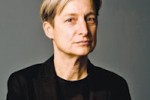Judith Butler, Once More a Target of Critics Who Would Silence Her
Readers here may recall I’ve written and shared about literary scholar and contemporary philosopher Judith Butler, a frequent target of criticism by right-wing conservative Jewish commentators, owing to positions of hers such as support for the boycott/divest/sanction (BDS) movement with regard to Israel. Some people in this debate–like Peter Beinart in his book The Crisis of Zionism–support boycotting only those goods that come from the Occupied Territories, not all of Israel. That’s my position, too. I’m not certain where Butler lands on that point–but regardless, unlike her opponents, I fully support her right to freely express herself and be heard, in all realms–political, critical and aesthetic.
All this comes up again because of a new instance of the Jewish establishment trying to banish her voice from the communal conversation. In the current episode, Philip Weiss writes in a blog post headed, “Jewish community commits intellectual suicide before our eyes,” that Butler had been asked to participate in a March 6 discussion of Franz Kafka at NYC’s Jewish Museum, but the invitation was withdrawn, owing to what Weiss believes was ‘pressure from donors.’ Weiss writes, “One critic said, ‘The hosting of [BDS] advocate Judith Butler by The Jewish Museum is a slap in the face to every Jew,’ Richard Allen, head of JCC Watch, told JNS.org.” This, all about a discussion of Kafka, with no direct relevance to Israel.
In the same vein of craven submission to angry types, the museum also recently canceled a panel that was to discuss John Judis’s important new book Genesis: Truman, American Jews, and the Origins of the Arab/Israeli Conflict. Many Jews on the right are nowadays inflamed by discussions like these, and many organizations, whether or not they share the same conservative ideology, succumb to threats and pressure.
This is all kind of personal to me. Judith Butler and I grew up in the same Jewish community in the suburbs of Cleveland, Ohio, where her father, known to all his patients as “Danny,” was a friendly family dentist. He looked after the teeth of all five Turners. He resembled Jack Paar, but nicer looking. Judith’s sister Diane was in my same year in school, where we knew each other. She moved to NY at around the same time I did, as part of a modern dance company, and we continued to see each other in the city from time to time. I occasionally heard from Diane about her sister, Judith, already then a professor, and a rising star in academia. She is an honorable person and a serious scholar. She should not be castigated or exiled for what I know to be an honest expression of belief, arrived at through careful deliberation and the weighing of difficult moral choices. As an example of her thoughtfulness, I submit this transcript of a talk she gave last February at Brooklyn College. It is well worth reading, and all in her own words.


